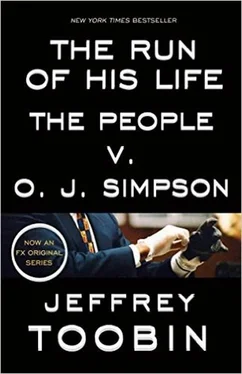But Cravin was a happy camper compared to Lon Cryer, a forty-three-year-old black telephone company employee. Cryer said he had been enraged one time when a female deputy had told him to get off the patio of the hotel when she allowed several white jurors to remain. As a result, Cryer said, “I’m to the point where I don’t really trust anybody involved here. I mean, no disrespect to you, Your Honor, I don’t even trust you, sir. I mean, I don’t trust anybody.” The experience with the deputy, Cryer said, reminded him of some other things.
“Tell me about that,” Ito prompted.
“About police and-well, I-you know, I have no problems with police officers myself, but it kind of reminds me of why so many black men in America have such a problem with being confronted with white police officers in situations like when they are operating their cars, and they become very defensive about it, and it just kind of made me realize that those situations do exist, and you don’t really have to be doing anything for them to take it upon themself to be harassing toward you.”
One can scarcely imagine a monologue more likely to alienate the prosecutors in the case. But Clark and Darden made no effort to remove Cryer, and Ito completed his examination of the jurors without finding reason to dismiss any more of them. In the end, the notion of a prosecution conspiracy to eliminate hostile jurors was absurd. If anything, the prosecution probably should have been more aggressive in ferreting out the biases of potential and sitting jurors in the case. (After all, several months later, on the day the verdict came in, it was Lon Cryer who showed his support for the defendant in the most dramatic way.)
Ito did make one change as a result of his interviews with the jurors. Responding to the complaints of Cryer and a black twenty-five-year-old flight attendant, Tracy Hampton, the judge transferred three of the deputies who had been guarding the jurors at the hotel. The jurors noticed their absence on the night of Thursday, April 20, and several of them were outraged. They had formed attachments to some of the deputies and felt that the deputies had been treated unfairly. Thirteen jurors decided to write a letter of protest to Ito-and to back it up with an even more conspicuous display.
The following morning, Friday, April 21, began with one of the more curious public spectacles in the history of American jurisprudence. Every morning, the jurors would be taken from their bus to a lounge on the eleventh floor of the courthouse. A few minutes before testimony began, they would go down a freight elevator to the ninth floor, where they would walk single file past the reporters and spectators assembled for the day. On this Friday, the thirteen protesting jurors all wore black outfits to court, as in an ersatz funeral procession. The rest of the jurors, the remnants of the Jeanette Harris clique-including Lon Cryer, Tracy Hampton, and Sheila Woods-defiantly wore bright colors in counterprotest. To a certain extent, the protest crossed racial boundaries; all of the white and Hispanic jurors, plus seven African-Americans, wore black, but all of the counterprotesters were African-Americans, including both of the remaining black men. But even this signal was muddled, because the two black men on the jury, Cravin and Cryer, couldn’t abide one another. (The protest provided a vivid demonstration of the Stockholm syndrome, which holds that captives come to identify with their keepers: The one thing that stirred the jurors from their usual passivity was a perceived attack on the deputies who “protected” them.)
In short, the jury was in chaos, leaving the trial on the verge of collapse. Ito canceled testimony for the day, explained to the jurors that the deputies had been transferred, not fired, and generally gave everyone a weekend to cool off. It worked for a while, and the following week the judge eased tensions on the jury somewhat when he finally dismissed Tracy Hampton. She had looked almost catatonic through the entire trial, rarely directing her glance away from her feet during testimony, and she had asked several times to be excused from the case. On May 1, without objection from either side, Ito agreed. (A few months later, Hampton recovered sufficiently to pose for a Playboy pictorial.)

It was clear, as the DNA testimony droned on in the courtroom, which juror most troubled Cochran and the defense team: Francine Florio-Bunten, a thirty-eight-year-old white telephone-company employee, who was following the prosecution’s case with keen interest. She was probably the most educated and worldly juror, the only one who complained about not being allowed to browse in bookstores. Jeanette Harris, the defense’s biggest known partisan, despised Florio-Bunten. During the jury protest in April, Florio-Bunten wore a defiant expression and a long, flowing black gown.
On May 25, Ito called the lawyers to chambers to say that he had received a letter in the mail the previous day. He read it out loud to them. “Dear Judge Ito,” it began.
I have been debating over and over what to do with this information. But after seeing you last night on the news telling the pain your family went through during the war and what my family in Germany endured, it touched my heart and I felt so grateful to live in a country with very strong civil rights and a strong constitution. I guess that’s why I feel so ashamed for the information I have.
I work for a literary agent. I’m only a receptionist. It is true I am very young, but I am aware of what is happening with this office and one of your jurors on the Simpson trial. It has been kept very secret, but I know for a fact that my boss has entered an agreement with a juror and her husband. The working title for the book proposal is, ‘Standing Alone: A Verdict for Nicole.’ It is obvious to me that the woman and her husband came to the conclusion of Mr. Simpson’s guilt and sold the book with that agreement. I have not come to you sooner because I too feel Mr. Simpson is guilty. But after seeing you last evening on television, and seeing how what happened to your family and mine made you open your heart to the public, it affected me greatly…
I am in a moral dilemma that a 20-year-old receptionist should not be in. I can only identify the juror as female, once an alternate, husband became ill, about 40 years old, a white woman. She did not want to be on the jury, but her husband is the one driving this. She is very apprehensive and is worried this will become public. The husband wants her to stay on, but she wants off.
My boss has met with the husband at the Intercontinental Hotel, which I assume is where the jury is staying. I know you are a very fair and decent man and judge. So I know and have faith that you will use this information in a way that you know best…
The letter, which was postmarked Los Angeles, was signed “Anonymous.” There was no mystery to anyone about the subject of the letter. Florio-Bunten was thirty-eight years old, and in late April she had asked to be removed from the jury because her husband was suffering from pneumonia. (At that time Ito talked her into remaining on the case.) Still, attempting to be thorough, Ito decided to undertake the by now familiar ritual of bringing the jurors into chambers one by one and asking them about the letter. Were they writing books? Had they spoken to a literary agent? All the jurors-including Florio-Bunten-said no.
Just in passing, in the course of these interviews in his chambers on May 25, Ito told each juror not to discuss the subject of his questions with the jurors who had yet to be interviewed. But Yolanda Crawford, a twenty-five-year-old black woman, told Ito that she thought two jurors had violated that instruction. She said that when Farron Chavarria, a twenty-nine-year-old Hispanic woman, returned to the jury room from Ito’s office, she “wrote on a newspaper” and called Florio-Bunten over to read the note. “Just looked like they were trying, you know, to be secretive about it,” Crawford said.
Читать дальше













